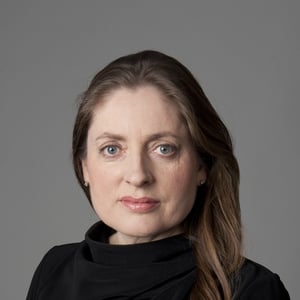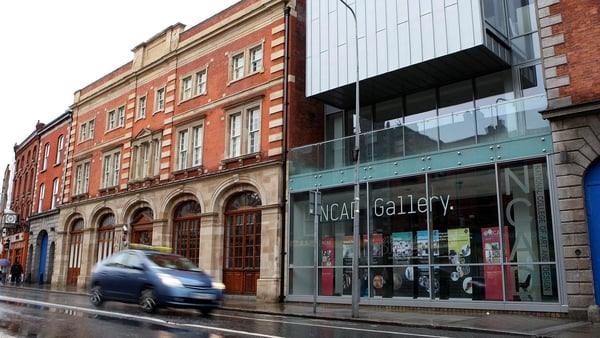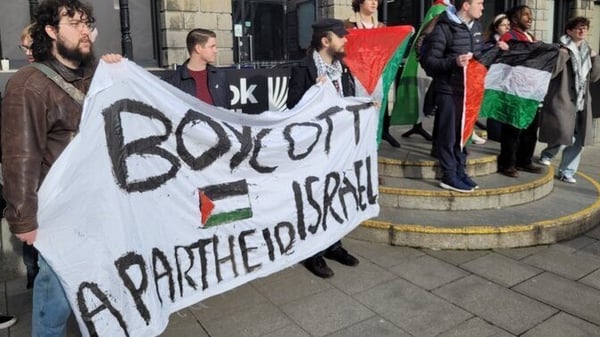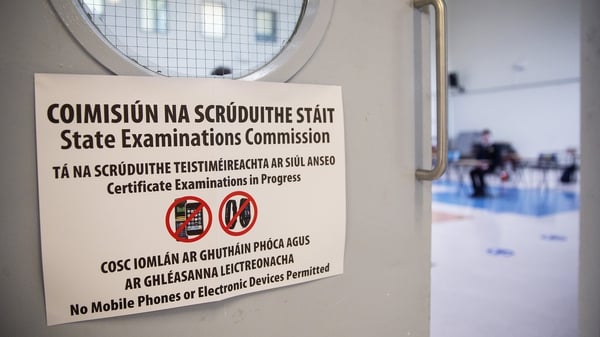In the square by the Arts block in Trinity College on Friday tourists queued in the sunshine for entry to the Book of Kells, and students sat in groups on the lawn winding down for the weekend or taking breaks from the library.
They are in the thick of it now, end of year exams began this week.
Student leaders like László Molnárfi and Quinn Katz-Zogby have been closely watching the scenes unfolding on venerable campuses just like theirs across the US and now elsewhere too, where students - first at Columbia University - have set up encampments demanding that their universities divest from companies that they say "benefit from the genocide" in Gaza and disclose existing investments.
Students more widely are watching too, it would seem. This week 145 students joined Trinity College's Boycott Divestment Sanctions society, bringing its number from 250 to almost 400.
The US has seen an explosion in student activism that is being compared to the anti-war protests of the late 60s and the 70s, when the Vietnam war raged, and campuses became epicentres of opposition.
The pattern here is in many ways a mirror image of what was happening in the US campuses prior to the establishment of the encampments.
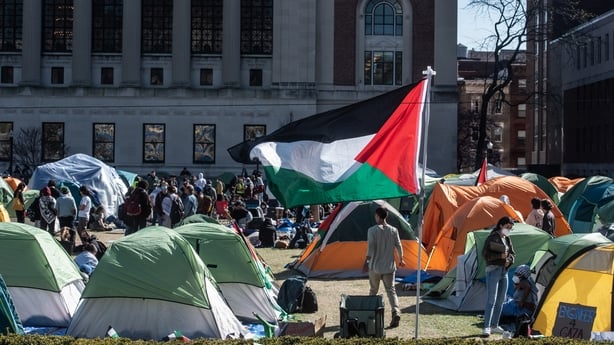
In a number of Irish campuses student unions have, since October, been implacable in their support for Palestine and the people of Gaza.
They have implored their universities to examine any ties they may have with Israeli companies or universities, and to make public calls for a ceasefire.
Only one college, University of Galway, has done this. In February, in a lengthy statement, its president Professor Ciarán Ó hÓgartaigh called for "an immediate, permanent ceasefire and for the release of hostages". He also said the university would move to strengthen relationships with universities in Gaza, the West Bank and East Jerusalem and would review its relationship with Israeli institutions.
This is the stance that student movements in other colleges are demanding.
"We tried engaging, we sent open letters, we gathered petitions," president of Trinity College Students Union László Molnárfi told RTÉ News on Friday.
"When we got no engagement, we began to protest." Those protests included the occupation of buildings on campus and a blockade of the Book of Kells exhibition in February.
On Thursday a group of around 30 Trinity students disrupted a meeting billed as a consultative forum for staff.
At UCD, the pattern has been the same. On Tuesday students demonstrated as Nancy Pelosi, former Speaker of the US House of Representatives, was conferred with an honorary degree.
Student’s Union president at UCD, Martha Ní Riada was removed by security staff from the conferring ceremony after she shouted: "Pelosi is a Zionist and a war criminal."
On Friday Martha told RTÉ News; "We have tried engaging in all the other ways. We’ve written letters, sent petitions, but the stance of the university has not changed.
"My aim as a student representative [in disrupting the conferring] was to try to let the views of students be known."
Responding to a request for comment on the student’s demands, UCD referred RTÉ News to a letter its president wrote in late November.
In it, Professor Orla Feely invoked a report from the University of Chicago called the Kalven Report and said; "Were it to be our practice to take an institutional position on geopolitical matters, we would be inhibiting the freedom of members of our community to express their individual positions and suppressing our ability to sustain and respect a diversity of views."
The Kalven report, which outlines the view expressed by UCD, is cited privately by other universities too, in support of their neutral stance on what is happening in Gaza.
Trinity College told RTÉ News on Friday; "As stated at a staff update in March, Trinity utterly abhors violence, and the appalling human suffering in Gaza. Trinity wishes to see an immediate end to the war in Gaza. The Provost of Trinity has since met with the Palestinian Ambassador and discussed ways of providing further practical educational support."
But students accuse the universities of hypocrisy. They point to the unequivocal support they gave to Ukraine when Russia invaded that country.
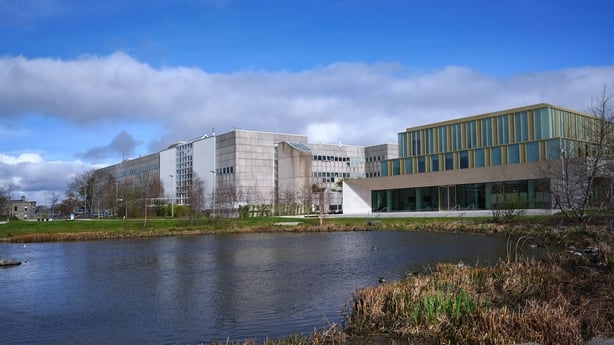
In March of 2022, UCD wrote: "UCD deplores and condemns the actions of Russia in invading and attacking Ukraine. This act of military aggression is a violation of international law and is completely unjustified."
"It’s just glaring hypocrisy," said Martha Ní Riada. "When it comes to Palestine, the contrast couldn’t be starker."
And she told RTÉ News that the conferring of an honorary degree on Nancy Pelosi further exposed this hypocrisy. "By inviting in someone from a government that is currently funding a genocide, and celebrating her with an honorary degree, that is 'taking a side".
In January, the International Court of Justice ordered Israel to take all measures to prevent genocidal acts in Gaza but stopped short of telling it to halt the war.
Last month the UN Special Rapporteur on the occupied Palestinian territories Francesca Albanese said there are "clear indications" that Israel had violated three of the five acts listed under the UN Genocide Convention. Israel rejected the report saying its "war is against Hamas, not Palestinian civilians".
Like UCD'S Martha NíRiada, László Molnárfi at TCD dismisses any suggestion that the stance of the universities here is about protecting academic freedom.
"When Russia invaded Ukraine Trinity cut ties immediately and it lit up the front facade with the colours of Ukraine."
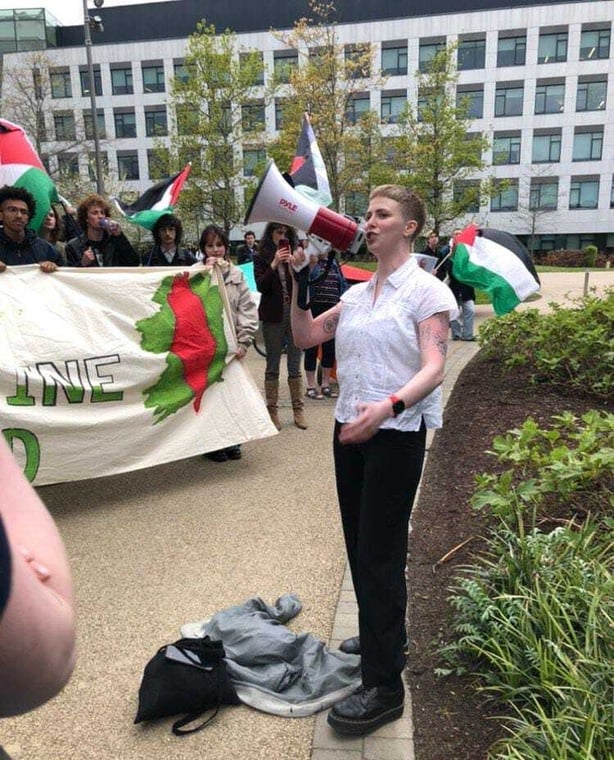
Trinity College too condemned Russia’s invasion.
László says students are asking "are Palestinian lives worth less than Ukrainian lives?".
These student leaders point to the links their colleges have with Israeli universities - mostly through the European Horizon research funding programme. This makes Irish universities "indirectly complicit" they say.
"Research carried out in these [Israeli] universities become the bombs and the weapons and the propaganda used to support the apartheid state of Israel," László said.
Of the students who are protesting this he said, "you cannot be a human being and sit idly by".
"As human beings, it's a horrible thing, we can see ourselves in [the people of Gaza]," Quinn added.
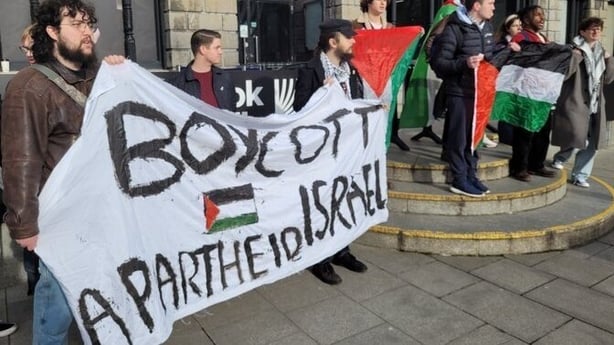
Sitting in the sunshine in Trinity’s Fellow’s Square László Molnárfi and Quinn Katz-Zogby discussed the student protest movements of the 60s and 70s. They spoke about student opposition to apartheid in South Africa here in the 80s and they say Trinity College only cut ties with that apartheid regime when the Irish Government did.
I asked them about claims that Jewish students on US campuses fear for their safety because of the protests in support of Gaza.
Quinn, who is the incoming Chair of the BDS group in the college, responded with energy: "I am a Jewish student on campus," he said, "my great grandparents fled Nazi Germany".
Dismissing any suggestion that such protests are antisemitic he said; "It’s very disheartening to see my own culture diminished. My own identity is being weaponised and used against people [in Gaza] that I also feel kinship towards."
Quinn is from the US and as his first name hints, he also has Irish heritage.
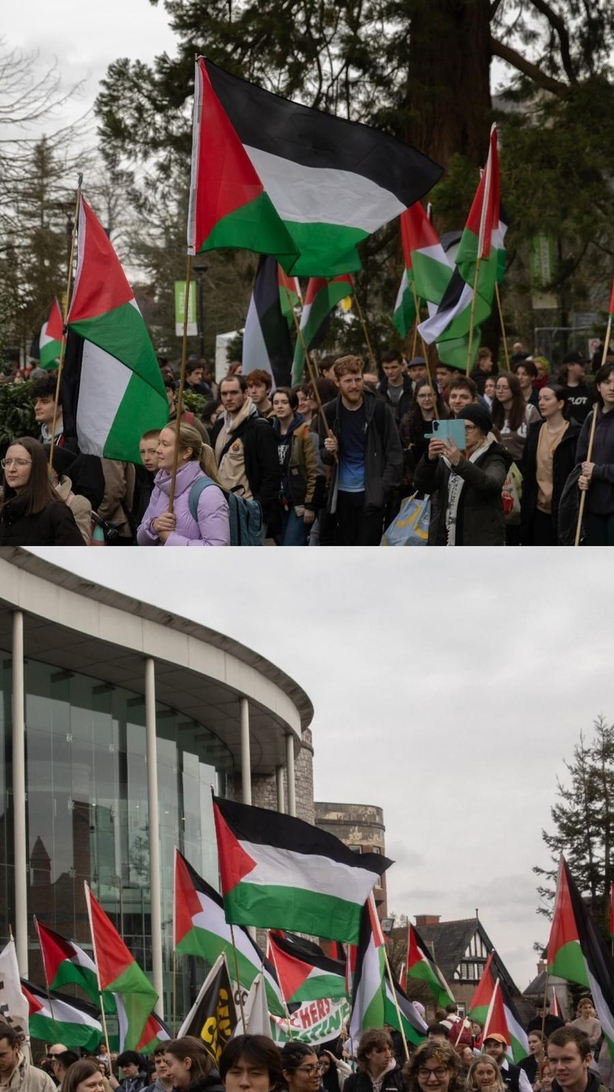
In Cork at UCC, students are watching events on US campuses too. "[The student] actions are incredibly brave and commendable," UCCSU Engagement Officer Hayley O’Connell told RTÉ News on the phone. "We can feel very stuck at the minute not knowing what to do. We have staged a lot of actions across our campus, and we are being ignored, but you can’t ignore people camped out on your grass."
Students at UCC have held a number of protests, including a walk-out last month.
"UCC applauds itself as a university of sanctuary but their silence on [Gaza] speaks volumes," Hayley said.
She too pointed to how UCC was quick to condemn the Russian invasion of Ukraine, and used the same word, "its hypocrisy", she said.
"Our demands are clear and simple; for UCC to make a statement akin to that of University of Galway calling for a ceasefire, condemning the genocide, and to commit to reviewing their academic ties with Israel."
UCC told RTÉ News on Friday; "UCC acknowledges the deeply distressing situation in Gaza. The events of October 7 in Israel and the ongoing crisis in Gaza are utterly heart-breaking and abhorrent. Our hope is for a peaceful resolution to the current conflict. UCC recently welcomed the Palestinian Ambassador to campus to discuss areas of mutual co-operation."
The academic year may be drawing to a close. At UCC, exams began yesterday, they begin at UCD in two weeks' time, but these student leaders don’t believe that their campaigns will end then.
They are strategising.
UCCSU will hold a public meeting next Tuesday for students and staff at which they will discuss their next steps.
"Once the exams are finished we are going to do more," Martha Ní Riada told me.
On Wednesday László Molnárfi posted on social media: "We can make the mass student uprising in the US possible here. TCDSU and TCD BDS are organizing something massive after exams. This can only happen if you get involved."
On Friday evening, sitting in Fellows Square in the sun at Trinity College, or speaking on the phone, these student leaders were tight-lipped on specifics.

